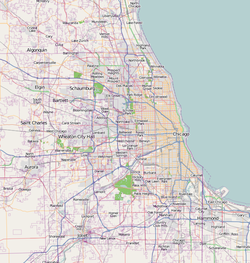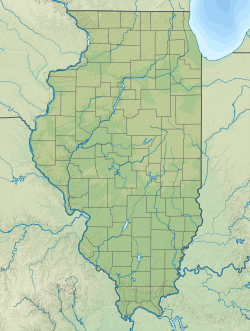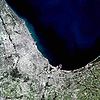Highland Park, Illinois | |
|---|---|
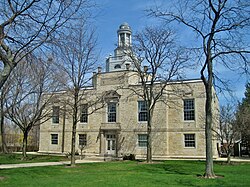 Highland Park City Hall | |
 Location of Highland Park in Lake County, Illinois | |
| Coordinates: 42°10′57″N 87°48′25″W / 42.18250°N 87.80694°W | |
| Country | |
| State | |
| County | |
| Township | Moraine, West Deerfield |
| Founded | 1869 |
| Government | |
| • Mayor | Nancy Rotering |
| Area | |
• Total | 12.28 sq mi (31.79 km2) |
| • Land | 12.24 sq mi (31.71 km2) |
| • Water | 0.03 sq mi (0.08 km2) |
| Population | |
• Total | 30,176 |
• Estimate (2021)[3] | 30,177 |
| • Density | 2,464.96/sq mi (951.72/km2) |
| Time zone | UTC-6 (CST) |
| • Summer (DST) | UTC-5 (CDT) |
| ZIP Codes | 60035, 60037 |
| Area codes | 847/224 |
| FIPS code | 17-34722 |
| Wikimedia Commons | Highland Park, Illinois |
| Website | cityhpil.com |
Highland Park is a suburban city located in southeastern Lake County, Illinois, United States, about 25 miles (40 km) north of downtown Chicago. Per the 2020 census, the population was 30,176.[2] Highland Park is one of several municipalities located on the North Shore of the Chicago metropolitan area. According to the United States Census Bureau, the median household income in Highland Park exceeded an estimated $159,567 in 2022.[4]
History
[edit]A traveler in the area in 1833 described visiting a village of bark-covered structures where he ate roasted corn with a chief named Nic-sa-mah at a site likely located south of present-day Clavey Road and east of the Edens Expressway.[5]
In 1847, two German immigrants, John Hettinger and John Peterman founded a town along Lake Michigan, which they called St. John's. Soon, the town was abandoned, due to questions regarding ownership of the land. Three years later, another German Immigrant, Jacob Clinton Bloom, founded Port Clinton, which happened to be just south of St. John's. Port Clinton was described by Elijah Middlebrook Haines as "one of the most promising villages in the city". In 1854, a lighthouse was built in Port Clinton, thanks to funding by the US Congress and sponsorships from Illinois representatives. Despite having a functioning lighthouse with a keeper, a pier, sawmill, and a plank road, Port Clinton did not have a train station in 1855. In 1860, Port Clinton stopped growing as a town, and the lighthouse was shut down.[6]
In 1867, ten men purchased Highland Park for $39,198.70. They were the original stockholders of the Highland Park Building Company. Following construction of the Chicago and Milwaukee Railroad, a depot was established at Highland Park and a plat, extending south to Central Avenue, was laid out in 1856.[7] At that point, Highland Park was settled on mostly scattered farms and undeveloped forested land.[6] Highland Park was established as a city on March 11, 1869, with a population of 500, and evolved from the two settlements of St. John and Port Clinton; St. John's Avenue and Port Clinton Square are named after the settlements.[6][7] Highland Park was named from its parklike setting at a lofty elevation relative to the lake, and was given its name from Walter S. Gurnee.[8] The town annexed the village of Ravinia in 1899.
From its establishment in 1869 until November 1, 1900, Highland Park was a "dry" community, in which the sale of alcoholic drinks was prohibited.[9]
In 2013, Highland Park passed an ordinance banning assault weapons within the city. In 2015, the U.S. Court of Appeals for the Seventh Circuit upheld the ban,[10] and later that year, the U.S. Supreme Court allowed the ruling to stand.[11][12]
On July 4, 2022, a mass shooting occurred at a Fourth of July parade in Highland Park, killing seven people and injuring dozens more. A suspect was apprehended hours later and charged with first-degree murder.[13][14]
Geography
[edit]According to the United States Census Bureau, the city has a total area of 12.2 square miles (31.7 km2), of which 12.2 square miles (31.6 km2) is land and 0.039 square miles (0.1 km2), or 0.27%, is water.[15] Its geographic features include a 100-foot-high (30 m) bluff running along 6 miles (10 km) of Lake Michigan shoreline and deep, wooded ravines extending up to 1 mile (1.6 km) inland. Elevations range from 580 to 725 feet (177 to 221 m) above sea level.
Demographics
[edit]| Census | Pop. | Note | %± |
|---|---|---|---|
| 1880 | 1,154 | — | |
| 1890 | 2,163 | 87.4% | |
| 1900 | 2,806 | 29.7% | |
| 1910 | 4,209 | 50.0% | |
| 1920 | 6,167 | 46.5% | |
| 1930 | 12,203 | 97.9% | |
| 1940 | 14,476 | 18.6% | |
| 1950 | 16,808 | 16.1% | |
| 1960 | 25,532 | 51.9% | |
| 1970 | 32,263 | 26.4% | |
| 1980 | 30,599 | −5.2% | |
| 1990 | 30,575 | −0.1% | |
| 2000 | 31,365 | 2.6% | |
| 2010 | 29,763 | −5.1% | |
| 2020 | 30,176 | 1.4% | |
| 2021 (est.) | 30,177 | [3] | 0.0% |
| U.S. Decennial Census[16] 2020 Census[2] | |||
2020 census
[edit]| Race / Ethnicity (NH = Non-Hispanic) | Pop 2000[17] | Pop 2010[18] | Pop 2020[19] | % 2000 | % 2010 | % 2020 |
|---|---|---|---|---|---|---|
| White alone (NH) | 27,112 | 25,845 | 24,825 | 86.44% | 86.84% | 82.27% |
| Black or African American alone (NH) | 488 | 516 | 462 | 1.56% | 1.73% | 1.53% |
| Native American or Alaska Native alone (NH) | 8 | 22 | 25 | 0.03% | 0.07% | 0.08% |
| Asian alone (NH) | 707 | 848 | 1,094 | 2.25% | 2.85% | 3.63% |
| Native Hawaiian or Pacific Islander alone (NH) | 2 | 9 | 0 | 0.01% | 0.03% | 0.00% |
| Other race alone (NH) | 29 | 27 | 134 | 0.09% | 0.09% | 0.44% |
| Mixed race or Multiracial (NH) | 227 | 329 | 948 | 0.72% | 1.11% | 3.14% |
| Hispanic or Latino (any race) | 2,792 | 2,167 | 2,688 | 8.90% | 7.28% | 8.91% |
| Total | 31,365 | 29,763 | 30,176 | 100.00% | 100.00% | 100.00% |
2010 census
[edit]As of the 2010 United States census,[20] there were 29,763 people living in the city. The racial makeup of the city was 91.05% White, 1.84% Black or African American, 2.9% Asian, 0.18% Native American, 0.03% Pacific Islander, 2.51% of some other race and 1.48% of two or more races. 7.28% were Hispanic or Latino (of any race).
As of the census[21] of 2000, there were 31,365 people, 11,521 households, and 8,917 families living in the city. The population density was 2,537.5 inhabitants per square mile (979.7/km2). There were 11,934 housing units at an average density of 965.5 per square mile (372.8/km2). The racial makeup of the city was 91.20% White, 1.78% African American, 0.08% Native American, 2.28% Asian, 0.01% Pacific Islander, 3.46% from other races, and 1.18% from two or more races. Hispanic or Latino of any race were 8.90% of the population.
There were 11,521 households, out of which 36.9% had children under the age of 18 living with them, 69.9% were married couples living together, 5.8% had a female householder with no husband present, and 22.6% were non-families. 19.5% of all households were made up of individuals, and 9.3% had someone living alone who was 65 years of age or older. The average household size was 2.71 and the average family size was 3.09.
In the city the population was spread out, with 27.0% under the age of 18, 4.6% from 18 to 24, 25.5% from 25 to 44, 27.8% from 45 to 64, and 15.1% who were 65 years of age or older. The median age was 41 years. For every 100 females, there were 95.9 males. For every 100 females age 18 and over, there were 92.5 males.
The median income for a household in the city was $100,967, and the median income for a family was $117,235. Males had a median income of $83,121 versus $41,175 for females. The per capita income for the city was $55,331. About 2.3% of families and 3.8% of the population were below the poverty line, including 3.9% of those under age 18 and 3.1% of those age 65 or over.
Economy
[edit]The international headquarters of Solo Cup Company were previously located in Highland Park, before relocating to neighboring Lake Forest in 2009.
Arts and culture
[edit]
Highland Park has several attractions including a downtown shopping district and the Ravinia Festival. Ravinia Festival is an open-air pavilion seating 3,200, which hosts classical, pop, jazz and Latin concerts in the summers. It has been the summer home of the Chicago Symphony Orchestra since 1936. Concert-goers can purchase seats in the covered pavilion or tickets to sit on the lawn. Many visitors arrive early and picnic on the lawn before and during concerts.[22] The festival is located in Ravinia District, originally an artists' colony, which still retains much of its early character and architecture.
Highland Park has several landmark structures listed in the National Register of Historic Places, notably the Willits House by Frank Lloyd Wright. In addition to several houses designed by Wright, the National Register lists homes designed by prominent architects including John S. Van Bergen, Howard Van Doren Shaw, Robert E. Seyfarth, and David Adler. Landscape architect Jens Jensen lived in Highland Park and designed a number of projects in the community that are listed on the register.
There are three public beaches in Highland Park: Rosewood Beach, Moraine Beach (part of which is available for off-leash dogs), and Park Avenue Beach (which also has a boating facility). Highland Park is also home to the North Shore Yacht Club.
Government
[edit]
The City of Highland Park is a council-manager government. The nonpartisan City Council consists of seven members, including an elected mayor and six council members, all elected at-large and serving staggered four-year terms. The current city council consists of:[23]
| Position | Name | First elected | Term expires |
|---|---|---|---|
| Mayor | Nancy Rotering | 2011* | 2023 |
| Councilman | Anthony Blumberg | 2011 | 2023 |
| Councilwoman | Michelle Holleman | 2015 | 2023 |
| Councilwoman | Annette Lidawer | 2021 | 2025 |
| Councilman | Adam Stolberg | 2017 | 2023 |
| Councilwoman | Kim Stone | 2013 | 2021 |
| Councilman | Andrés Tapia | 2021 | 2025 |
Politics
[edit]| Year | Democratic | Republican | Others |
|---|---|---|---|
| 2020 | 80.1% 15,416 | 18.6% 3,573 | 1.3% 246 |
| 2016 | 76.9% 13,576 | 17.7% 3,132 | 5.4% 946 |
Highland Park is considered a Democratic stronghold, giving Joe Biden more than 80% of its vote in the 2020 United States presidential election. Highland Park voters also tend to prefer Democrats in local races.
At the state level, Highland Park is a part of the 58th House District, represented by Bob Morgan (D-Highwood), and the 29th Senate District, represented by Julie Morrison (D-Deerfield). At the county level, the city is split between Districts 11 and 12, represented by former Highland Park City Councilman Paul Frank (D-Highland Park) and former Lake Forest Mayor Mike Rummel (R-Lake Forest), respectively.
Mayors
[edit]Mayors of Highland Park have included:
- Frank L. Hawkins (first mayor, elected April 13, 1869)[25][26]
- Raymond Geraci (served 1970–1975 and 1995–1999)[27]
- Daniel M. Pierce (served 1987–1995 and 1999–2003)[28]
- Michael Belsky (served 2003–2011)[29]
- Nancy Rotering (incumbent mayor since 2011)[30]
Education
[edit]North Shore School District 112 operates an early childhood center, seven elementary schools, and two middle schools.
Township High School District 113 operates Highland Park High School, as well as Deerfield High School in nearby Deerfield.
Transportation
[edit]
The main highway in Highland Park is US-41, which connects Chicago to Milwaukee. Commuter rail is available at four Metra stations within city borders (Braeside, Ravinia Park, Ravinia, and Highland Park), as well as two in nearby Highwood (Highwood and Fort Sheridan) on the Union Pacific North Line, which begins in Chicago and terminates in Kenosha, Wisconsin. Pace also offers several bus routes. Boat launch facilities are available along Lake Michigan. O'Hare International Airport is located approximately 20 miles (32 km) southwest. The Skokie Valley Trail runs through town.
Notable people
[edit]Highland Park is popular with professional athletes, as the Chicago Bears practice facility is in nearby Lake Forest. Several members of the championship Chicago Bulls of 1990s also live or lived in Highland Park including Michael Jordan,[31] Scottie Pippen,[32] Toni Kukoc,[33] B. J. Armstrong,[34] and the late GM Jerry Krause, thanks to its proximity to the team's former practice facility in neighboring Deerfield.[35] Current Phoenix Suns' CEO Josh Bartelstein grew up in Highland Park, as well.[36]
Musician Richard Marx grew up in Highland Park, Smashing Pumpkins front man Billy Corgan resides here, Olympic figure skater Jason Brown attended high school in Highland Park, and actress Rachel Brosnahan from Amazon's The Marvelous Mrs. Maisel, grew up in Highland Park[37] and attended Highland Park High School. Actor Gary Sinise attended Highland Park High School and co-founded the Steppenwolf Theatre in neighboring Deerfield.[38]
Academy Award winning screenwriter William Goldman was raised in Highland Park.
Game of Thrones showrunner D. B. Weiss grew up in Highland Park and was inspired to get into screenwriting after hearing a talk by another Highland Parker, David Seltzer, screenwriter of The Omen and Lucas (1986 film), which he also directed.[39] Prolific screenwriter Allan Loeb, too, hails from Highland Park.'
Award-winning novelist and short story writer Peter Orner and his brother, Eric Orner, a well-known cartoonist and graphic novelist, are both Highland Park natives.
Grace Slick, lead singer of Jefferson Airplane, was born in Highland Park,[40] and journalist Jacob Scher lived here.[citation needed]
In popular culture
[edit]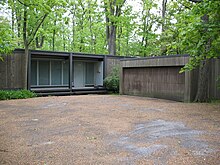
Highland Park is the location of the main characters' former home in the CBS drama The Good Wife.[41]
Highland Park was used for location shots for several movies written and directed by John Hughes in the 1980s including Ferris Bueller's Day Off, Weird Science, Sixteen Candles, Uncle Buck and Home Alone. Other popular films from the 1980s shot or partially set in Highland Park include Ordinary People, Risky Business,[42] and Lucas. Since 2000, Highland Park movies have included Kicking & Screaming and Shattered Memories of Love. In the film Shattered Glass, Stephen Glass, portrayed by actor Hayden Christensen, makes repeated reference to his family's residence in Highland Park as an indication of the high expectations they have for his career.
Highland Park was where the cast of Oxygen's Bad Girls Club resided for its twelfth installment.[43]
"Highland Park has the feel of a gated community without the actual gates", writes Vanity Fair, and has a tradition of "very clever minds who left to strike gold in Hollywood." The creators of the Revenge of the Nerds, Beethoven, and other films grew up in Highland Park.[44]
It also was the setting for the 2000/2001 Fox and PBS documentary show American High.
Sister cities
[edit]See also
[edit]- Danny Cunniff Park
- Highland Park High School
- Highland Park Public Library
- Highland Park Hospital
- Highland Park Presbyterian Church
References
[edit]- ^ "2020 U.S. Gazetteer Files". United States Census Bureau. Retrieved March 15, 2022.
- ^ a b c "Explore Census Data". United States Census Bureau. Retrieved April 15, 2022.
- ^ a b "City and Town Population Totals: 2020-2021". United States Census Bureau. July 5, 2022. Retrieved July 5, 2022.
- ^ "Explore Census Data". data.census.gov. Retrieved December 9, 2024.
- ^ Benton, Colbee Chamberlain (1957). A visitor to Chicago in Indian Days: "Journal to the 'Far-off West'". Chicago: Caxton Club. p. 79.
- ^ a b c Webster, Nancy (February 18, 2013). "Highland Park History: 1855". Chicago Tribune. Retrieved May 14, 2021.
- ^ a b Place Names of Illinois. p. 161.
- ^ Chicago and North Western Railway Company (1908). A History of the Origin of the Place Names Connected with the Chicago & North Western and Chicago, St. Paul, Minneapolis & Omaha Railways. p. 83.
- ^ "By Popular Vote: Highland Park was Dry for 31 Years". Highland Park, IL Patch. January 9, 2020. Retrieved April 6, 2020.
- ^ "US court upholds Highland Park's assault weapons ban". Chicago Sun-Times. April 27, 2015. Retrieved July 4, 2022.
- ^ Glanton, Dahleen; Berkowitz, Karen (December 7, 2015). "Supreme Court rejection of gun case considered a victory by Highland Park". Chicago Tribune. Retrieved July 4, 2022.
- ^ Liptak, Adam (December 7, 2015). "Supreme Court Won't Hear Challenge to Assault Weapons Ban in Chicago Suburb". The New York Times. Retrieved July 4, 2022.
- ^ Bacon, John; Hauck, Grace; Ortiz, Jorge L.; Stanton, Cady (July 4, 2022). "'I grabbed my kid and ran': 6 dead, dozens injured in shooting at July 4th parade in Chicago suburb". USA Today. Retrieved July 4, 2022.
- ^ "7th Person Dies Day After Highland Park Parade Mass Shooting". NBC Chicago. July 5, 2022. Archived from the original on July 5, 2022. Retrieved July 5, 2022.
- ^ "Geographic Identifiers: 2010 Demographic Profile Data (G001): Highland Park city, Illinois". United States Census Bureau, American Factfinder. Archived from the original on February 12, 2020. Retrieved December 7, 2012.
- ^ "Decennial Census of Population and Housing by Decades". United States Census Bureau. Retrieved June 4, 2016.
- ^ "P004: Hispanic or Latino, and Not Hispanic or Latino by Race – 2000: DEC Summary File 1 – Highland Park city, Illinois". United States Census Bureau.
- ^ "P2 Hispanic or Latino, and Not Hispanic or Latino by Race – 2010: DEC Redistricting Data (PL 94-171) – Highland Park city, Illinois". United States Census Bureau.
- ^ "P2 Hispanic or Latino, and Not Hispanic or Latino by Race – 2020: DEC Redistricting Data (PL 94-171) – Highland Park city, Illinois". United States Census Bureau.
- ^ "Highland Park, IL Population - Census 2010 and 2000 Interactive Map, Demographics, Statistics, Quick Facts - CensusViewer". CensusViewer.com. Retrieved August 17, 2017.
- ^ "U.S. Census website". United States Census Bureau. Retrieved January 31, 2008.
- ^ "Highland Park". North Shore Views. Archived from the original on March 14, 2013. Retrieved March 5, 2013.
- ^ "City of Highland Park, IL". www.cityhpil.com. Retrieved July 5, 2022.
- ^ "Dave's Redistricting". Retrieved April 14, 2022.
- ^ "Records - Highland Park History". highlandparkhistory.libraryhost.com. Retrieved April 12, 2023.
- ^ "Hawkins, Frank L." www.idaillinois.org. Retrieved April 12, 2023.
- ^ Norman, James T. (May 8, 2020). "Former Highland Park mayor dies from COVID-19 complications at age 91". Chicago Tribune.
- ^ "Welcome to Highland Park, IL". www.cityhpil.com. Retrieved April 12, 2023.
- ^ Berkowitz, Karen (August 9, 2016). "Former Highland Park mayor to head Center for Municipal Finance at U. of C." Chicago Tribune. Retrieved April 12, 2023.
- ^ Good, Gavin (November 21, 2022). "Nancy Rotering announces bid for 4th term as Highland Park mayor, citing need for 'compassionate leadership'". Chicago Tribune. Retrieved April 12, 2023.
- ^ "2700 Point Dr, Highland Park, IL 60035 | MLS #09814087".
- ^ Goldsborough, Bob. "Retired Chicago Bull Scottie Pippen lists Highland Park home for $2.8 million". chicagotribune.com.
- ^ "Isaacson: Kukoc right at home in Chicago". ESPN.com. June 9, 2011.
- ^ TRIBUNE, Bob Goldsborough, SPECIAL TO THE (October 11, 2009). "Ex-Bull relists 12-room house". chicagotribune.com.
{{cite web}}: CS1 maint: multiple names: authors list (link) - ^ Byrne, John. "Bulls open West Side practice facility". chicagotribune.com.
- ^ "JOSH BARTELSTEIN NAMED CHIEF EXECUTIVE OFFICER OF PHOENIX SUNS AND PHOENIX MERCURY". www.nba.com. Retrieved March 28, 2024.
- ^ Swartz, Tracy. "How Rachel Brosnahan's Highland Park roots influenced her 'Mrs. Maisel' role". chicagotribune.com.
- ^ "History | Steppenwolf Theatre".
- ^ "How This Highland Park Geek Became a Game of Thrones Writer". Chicago Magazine. Retrieved March 28, 2024.
- ^ "Grace Slick | Biography, Jefferson Airplane, & Facts | Britannica".
- ^ "10 Ways 'The Good Wife' Gets Chicago Wrong". www.ChicagoNow.com. January 2013. Retrieved April 2, 2016.
- ^ Greg Dorn (May 6, 2013). "Highland Park remembers 'Risky Business' 30 years later". Chicago Tribune.
- ^ "Meet the cast of 'Bad Girls Club' Chicago, which is really 'Bad Girls Club' Highland Park". Chicago Sun-Times. December 17, 2013. Retrieved July 5, 2023.
- ^ Bissinger, Buzz (September 1998). "Shattered Glass". Vanity Fair. Retrieved April 2, 2016.
- ^ a b "Highland Park Sister Cities Foundation Website". Retrieved April 2, 2016.
